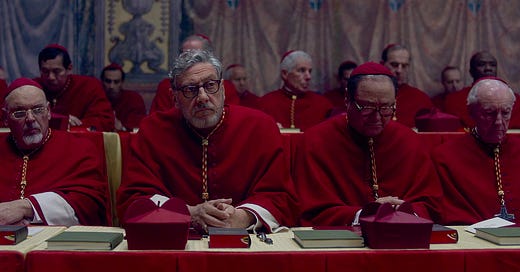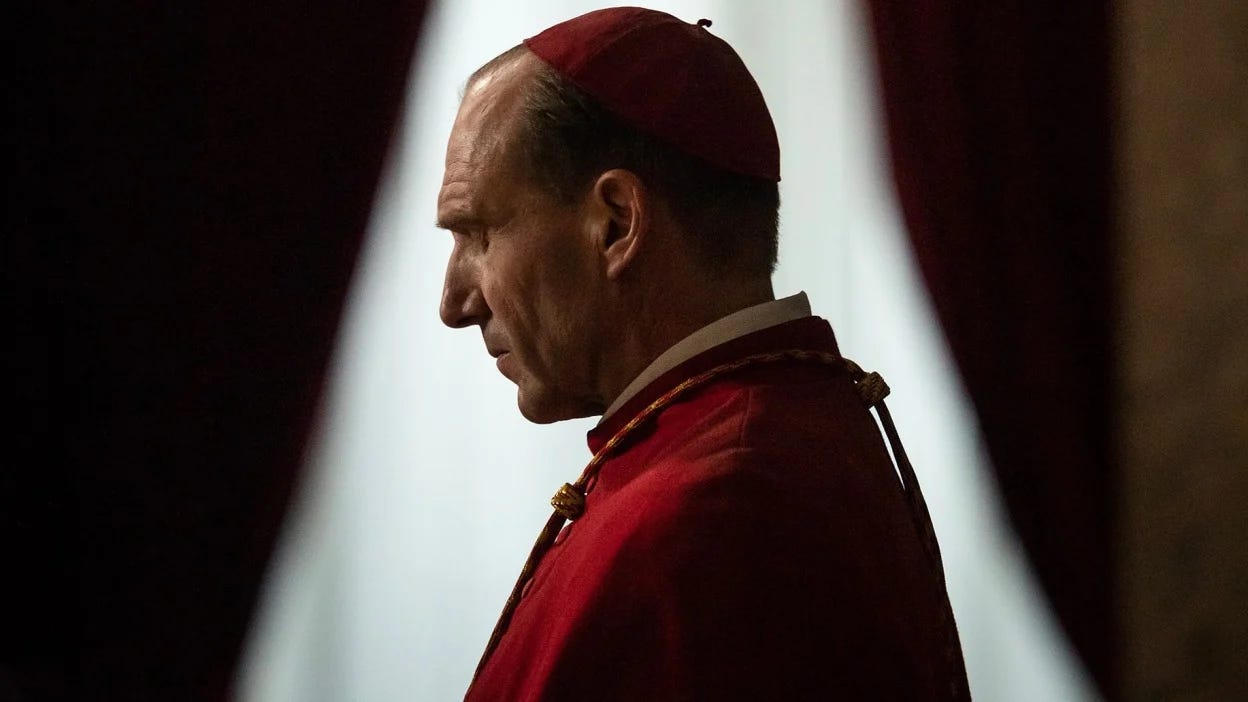‘Conclave’: Fiennes & Tucci at their finest
Painting a picture of a dangerously politicised papacy
The first section of this review is spoiler-free.
It’s surprising how many times Ralph Fiennes and Stanley Tucci have worked together on-screen: Maid in Manhattan, The King’s Man, and now Edward Berger’s Conclave.
It’s equally surprising that these two actors who have played childhood-defining roles and seem omnipresent in film have but three Oscar nominations between them and no wins.
For the more cynical and critical, it’s maybe not as surprising considering that the roles they are well-known for are household favourites and comfort characters: not the type of thing the Academy tends to reward. I feel confident in predicting a significant change here though; Conclave has given Fiennes and Tucci the political thriller that could potentially secure them more nominations than they’ve had before.
The trailer for Conclave doesn’t do it justice. If you’ve watched it and thought ‘this isn’t for me’ - don’t write it off just yet. Although a drama about the papacy, this is a story of obsessive ambition pursued at any and all costs. Berger’s direction teaches us that the even the holiest among us are not exempt from the pitfalls of the human condition, and more often than not it is the holiest that have the largest fall from grace.
Although entirely fictional in its twists and turns, there is a reality to the raw exposure of the papacy’s voting system: the conclave itself. Fiennes plays the Dean, Cardinal Lawrence, who is seemingly driven by a righteousness he does not always believe in. Tucci plays Cardinal Bellini who on the other hand, is a more emotional character and more liberal than neutral: leaving him exposed to rebuttals from right-wing candidate Cardinal Tedesco, played by Sergio Castellito. The inclusion of polar opposites that are such an accurate reflection from modern-day secular politics makes Conclave a more relatable allegory than anyone expected it to be. The script touches on themes of honesty, reputation and devotion whilst asking each of its characters the question of worth: are they worthy?
Although sometimes funnier than expected (thanks to the undeniable chemistry of Tucci and Fiennes) there is a persistent discomfort showcased through ominous shades of red, darkened Vatican buildings and the eerily silenced Catholic sisters. This makes it an unsettling watch, but contrasted by humorous line deliveries, it’s not too much to bear.
Spoilers ahead!
The addictiveness of this film is in its reveals. That slow-burn plot, the outrage we feel at sexual scandals or even just pure dishonesty: that’s what hooks you in with Conclave. Framing is a massively helpful tool for Berger - during the scene where Lawrence confronts Tremblay for the first time, I couldn’t help but feel that Tremblay being almost spotlighted by the lamp in the room was purposeful. Here was a man lying, who should be so cautious, instead so blatantly nonchalant and free to bask in the glory of his successful dishonesty. The sense of moral wrongdoing in this film from Adeyemi’s scandal to Tedesco’s warmongering juxtaposed by Benitez’s calm and collected composure is what forces us to have empathy with Lawrence and makes the film incredibly enjoyable.
I felt the ending was a little strange. Wasn’t opposed to it at all, but I would be curious to know Berger’s intention behind the ending. I understand the film is based on a 2016 novel of the same name, but in my screening we found the ending significantly humorous. Not the expectation I had of a film that forced me to care about a dead Pope, but surprising nonetheless.
I’m truly excited to see what the awards season brings for the cast and crew of this film. You can find my Letterboxd review here.





